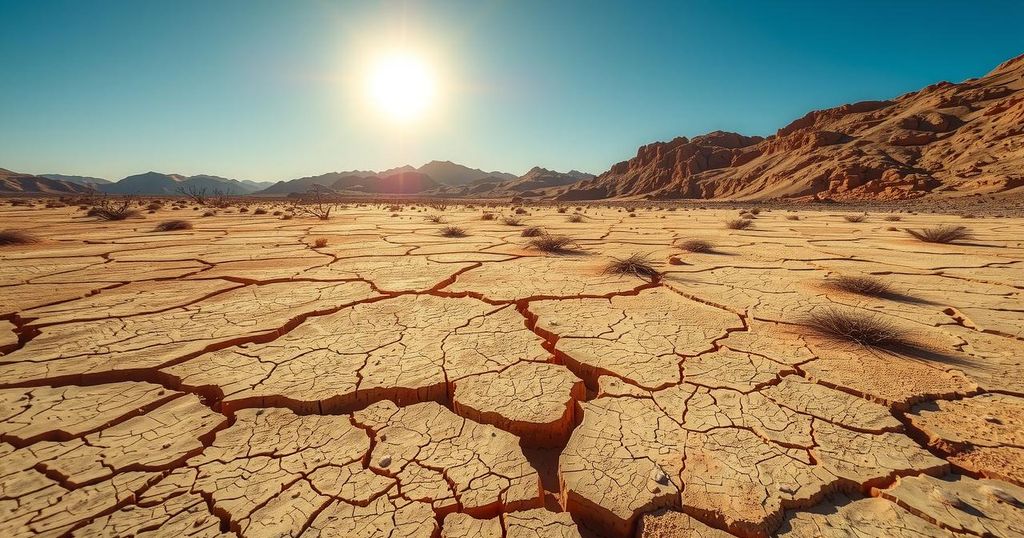Climate change
AFRICA, AUSTRIA, CLIMATE, CLIMATE CHANGE, COPENHAGEN CENTRE FOR DISASTER RESEARCH, EUROPE, EXTREME WEATHER, GLOBAL WARMING, IMPERIAL COLLEGE LONDON, INTERNATIONAL INSTITUTE FOR APPLIED SYSTEMS ANALYSIS, NETHERLANDS, ROYAL NETHERLANDS METEOROLOGICAL INSTITUTE, SOUTH SUDAN, SUDAN, UNITED KINGDOM, WORLD WEATHER AT
Isaac Bennett
0 Comments
Study Reveals Impact of Climate Change on Extreme Heat in South Sudan
A new WWA study indicates that South Sudan’s extreme heat in February 2025 was 2°C hotter and ten times more likely due to human-induced climate change. The findings reveal the increasing frequency and intensity of heatwaves, disproportionately impacting women and children. Adaptation strategies to enhance resilience are crucial for addressing the humanitarian crises exacerbated by climate change in South Sudan.
A recent study by World Weather Attribution (WWA) reported that South Sudan experienced extreme heat in February 2025, with temperatures at least 2°C hotter than typical, and the likelihood of such events increased tenfold due to human-induced climate change. Temperatures reached 40°C, indicating that extreme heat occurrences in the region are no longer infrequent, as noted by the team of 13 WWA scientists from prestigious institutions including the Royal Netherlands Meteorological Institute and Imperial College London.
The publication, released on March 10, 2025, emphasized the escalating climate threats faced by South Sudan, a nation already grappling with conflict, food insecurity, and economic challenges. During their analysis of the period from February 22 to 28, the scientists found that climate models might be underestimating the temperature rises, implying that the effects of human-induced warming could be even more severe than anticipated.
With global temperatures on the rise, South Sudan may experience increasing frequencies and intensities of heatwaves, further exacerbating its humanitarian challenges. The 2024 heatwave peaked later in the year while the 2025 event arrived earlier, suggesting a concerning trend of intensifying extreme heat and seasonal shifts.
The repercussions of extreme heat are disproportionately felt by women and girls, deepening existing vulnerabilities. South Sudan has one of the world’s highest maternal mortality rates, with only 29 percent of women being literate compared to 40 percent of men. Women, who predominantly work in the informal sector, particularly in agriculture and street vending, face heightened health risks due to exposure to extreme temperatures.
WWA scientists also highlighted how rising temperatures disrupt education, with schools closing due to extreme heat for two consecutive years. Such interruptions negatively affect girls’ education, increasing their chances of early marriage and hindering their ability to return to school.
The study pointed to insufficient infrastructure, indicating that poor roofing materials in schools and homes exacerbate indoor heat conditions. It suggested that adaptive measures, such as changing school hours and enhancing infrastructure, could alleviate some of the negative impacts.
Malnutrition is another critical concern, with approximately 860,000 children under five affected. Rising temperatures compound issues related to food insecurity and health risks, particularly for female-headed households, as conflicts and displacements further worsen the situation.
The report advocated for climate adaptation strategies to address gender and conflict-related inequalities, emphasizing the empowerment of women farmers and the establishment of protective measures for outdoor workers. It underscored the necessity of timely dissemination of early warning systems, which although showing progress, require enhancement to effectively save lives.
The February heatwave in South Sudan serves as a stark reminder of the urgent need for comprehensive climate action. The WWA study emphasizes the importance of integrating resilience strategies into regional and national planning to protect vulnerable populations effectively.
In conclusion, the study by World Weather Attribution underscores the critical challenges posed by extreme heat in South Sudan, attributing the severity of these conditions largely to human-induced climate change. Women and children are particularly affected, facing heightened health risks and educational disruptions. The findings call for urgent adaptations to infrastructure and societal practices to mitigate the adverse effects of rising temperatures, highlighting the importance of tailored strategies that address both climate and gender disparities.
Original Source: www.downtoearth.org.in




Post Comment